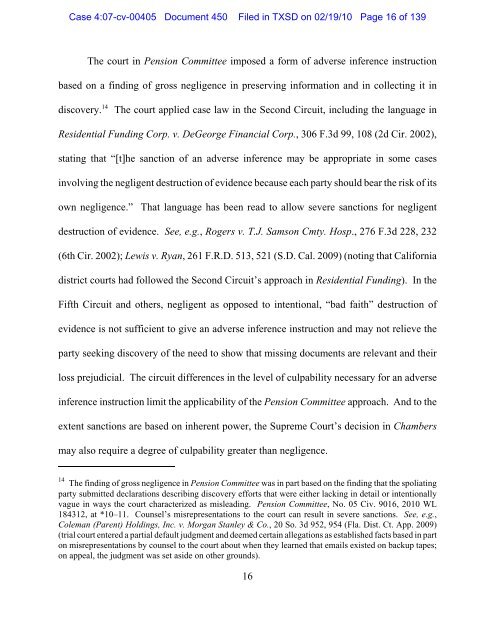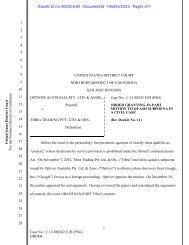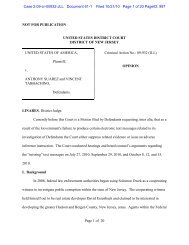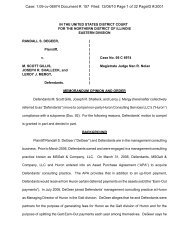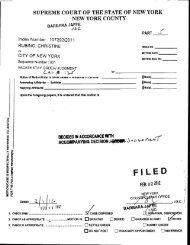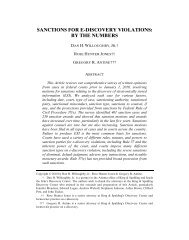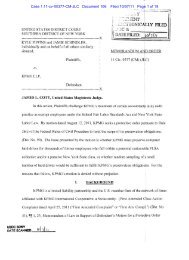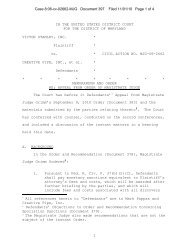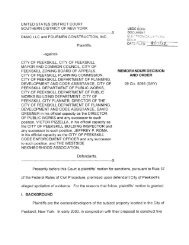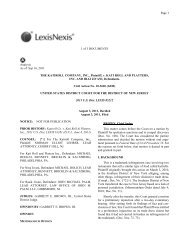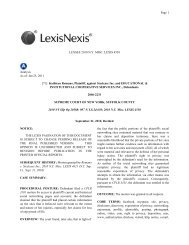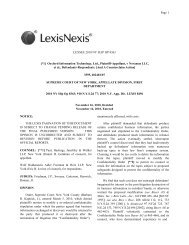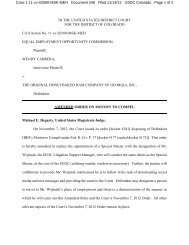Rimkus Consulting Group Inc. v. Cammarata - Ballard Spahr LLP
Rimkus Consulting Group Inc. v. Cammarata - Ballard Spahr LLP
Rimkus Consulting Group Inc. v. Cammarata - Ballard Spahr LLP
You also want an ePaper? Increase the reach of your titles
YUMPU automatically turns print PDFs into web optimized ePapers that Google loves.
Case 4:07-cv-00405 Document 450 Filed in TXSD on 02/19/10 Page 16 of 139<br />
The court in Pension Committee imposed a form of adverse inference instruction<br />
based on a finding of gross negligence in preserving information and in collecting it in<br />
discovery. 14<br />
The court applied case law in the Second Circuit, including the language in<br />
Residential Funding Corp. v. DeGeorge Financial Corp., 306 F.3d 99, 108 (2d Cir. 2002),<br />
stating that “[t]he sanction of an adverse inference may be appropriate in some cases<br />
involving the negligent destruction of evidence because each party should bear the risk of its<br />
own negligence.” That language has been read to allow severe sanctions for negligent<br />
destruction of evidence. See, e.g., Rogers v. T.J. Samson Cmty. Hosp., 276 F.3d 228, 232<br />
(6th Cir. 2002); Lewis v. Ryan, 261 F.R.D. 513, 521 (S.D. Cal. 2009) (noting that California<br />
district courts had followed the Second Circuit’s approach in Residential Funding). In the<br />
Fifth Circuit and others, negligent as opposed to intentional, “bad faith” destruction of<br />
evidence is not sufficient to give an adverse inference instruction and may not relieve the<br />
party seeking discovery of the need to show that missing documents are relevant and their<br />
loss prejudicial. The circuit differences in the level of culpability necessary for an adverse<br />
inference instruction limit the applicability of the Pension Committee approach. And to the<br />
extent sanctions are based on inherent power, the Supreme Court’s decision in Chambers<br />
may also require a degree of culpability greater than negligence.<br />
14 The finding of gross negligence in Pension Committee was in part based on the finding that the spoliating<br />
party submitted declarations describing discovery efforts that were either lacking in detail or intentionally<br />
vague in ways the court characterized as misleading. Pension Committee, No. 05 Civ. 9016, 2010 WL<br />
184312, at *10–11. Counsel’s misrepresentations to the court can result in severe sanctions. See, e.g.,<br />
Coleman (Parent) Holdings, <strong>Inc</strong>. v. Morgan Stanley & Co., 20 So. 3d 952, 954 (Fla. Dist. Ct. App. 2009)<br />
(trial court entered a partial default judgment and deemed certain allegations as established facts based in part<br />
on misrepresentations by counsel to the court about when they learned that emails existed on backup tapes;<br />
on appeal, the judgment was set aside on other grounds).<br />
16


